Focused on responsible growth in infrastructure
York Bridge Concepts (YBC) is committed to building timber bridges that are not only structurally sound and aesthetically pleasing but also environmentally sustainable.
Crafting A Higher Standard
We prioritize the use of ecological materials, including sustainably sourced timber and recycled materials, to construct bridges that meet the highest environmental standards. Explore the benefits of using these ecological materials and why they are a superior choice compared to traditional materials like culvert, concrete, or steel.
Around two-thirds of greenhouse gas (GHG) emissions in the built environment are attributed to the operation of buildings and infrastructure, known as operational carbon.
This can be mitigated through energy-efficient designs and the use of renewable energy sources. The remaining one-third of these emissions stem from the manufacturing, transportation, and installation of construction materials, referred to as upfront embodied carbon.
At York Bridge Concepts, we are committed to addressing both operational and embodied carbon. Our focus on sustainable timber bridge construction includes optimizing designs for energy efficiency and selecting materials with lower environmental impact with our Design-Build Process. By prioritizing renewable resources and innovative construction practices, we aim to significantly reduce the carbon footprint of our projects from inception through to their operational lifespan.
The benefits of sustainably sourced timber for bridges
At York Bridge Concepts, we use timber sourced from forests certified by the Forest Stewardship Council (FSC). This certification ensures that the wood we use is harvested responsibly, with minimal environmental impact. Our primary timber choices are Southern Yellow Pine and Douglas Fir, each offering unique advantages.
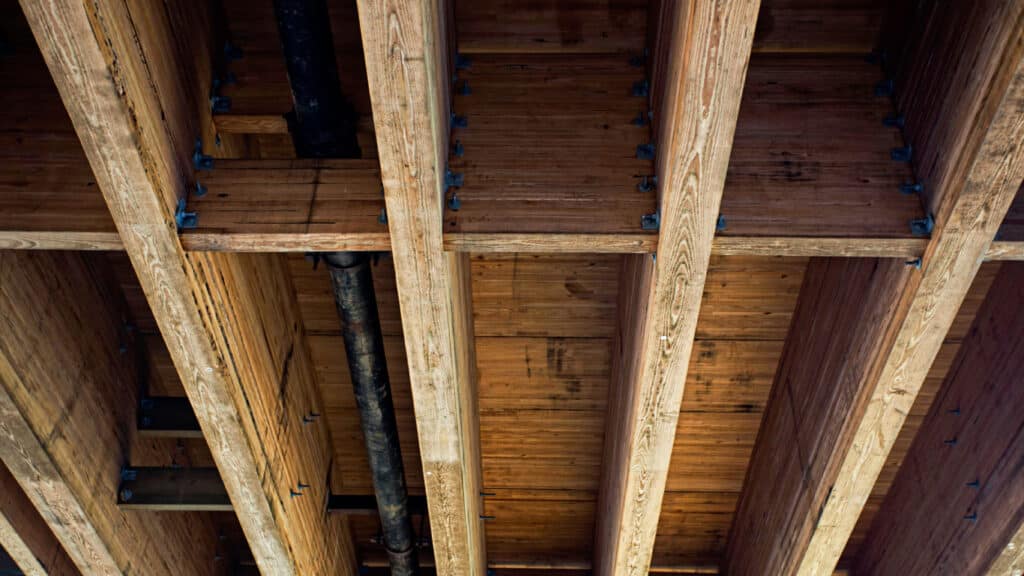
Southern Yellow Pine
Known for its strength and durability, Southern Yellow Pine is an excellent choice for structural components. Its dense grain and high load-bearing capacity make it suitable for various bridge applications.
Douglas Fir
Valued for its superior strength-to-weight ratio, Douglas Fir is ideal for both structural and aesthetic applications. Its natural resistance to decay and insects further enhances its longevity.
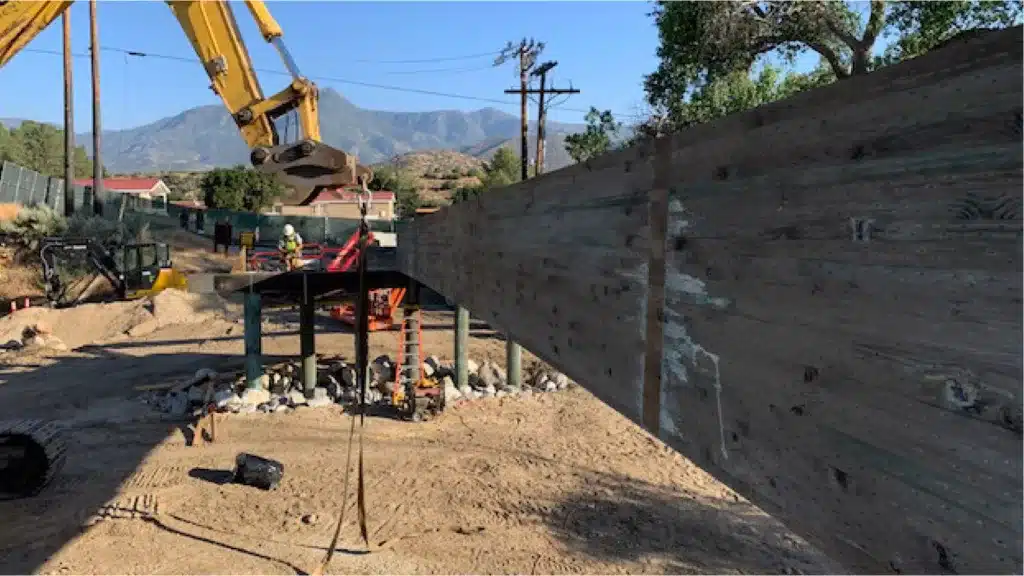
60%
REDUCTION IN GHG
Timber Has Low Embodied Carbon
At York Bridge Concepts, we understand the importance of minimizing environmental impact in our timber bridge projects. Manufacturing lumber is the least energy-intensive process compared to other construction materials, such as 100% recycled steel, concrete, and virgin steel.1 This low energy requirement contributes to wood’s exceptionally low embodied carbon, making it an environmentally friendly choice for sustainable bridge construction. Our commitment to using timber not only supports the reduction of greenhouse gas emissions but also aligns with our goal of creating durable, eco-conscious infrastructure.
Incorporating Recycled Ecological Materials For Your Timber Bridge
In addition to sustainably sourced timber, York Bridge Concepts incorporates recycled materials into our bridge designs, particularly for decking and handrail finishes. This practice aligns with our commitment to environmental stewardship and resource conservation.
The Benefits Of Using Recycled Materials
Waste Reduction
By using recycled materials, we help reduce waste that would otherwise end up in landfills. This contributes to a circular economy where materials are reused and repurposed.
Energy Efficiency
Recycling materials often require less energy than producing new materials, further lowering the overall environmental footprint of our projects.
Innovation and Durability
Recycled materials are often engineered to be highly durable and weather-resistant, ensuring that our bridges remain safe and functional for many years.
Comparing Ecological Timber Bridges To Traditional Materials
When considering bridge construction, potential customers might evaluate the benefits and drawbacks of various materials. Here, we compare ecological timber bridges to culvert, concrete, and steel bridges.
Timber Bridges vs. Culverts
Culvert are typically made from reinforced concrete or corrugated metal, they serve their purpose but lack the environmental benefits & durability of timber bridges:
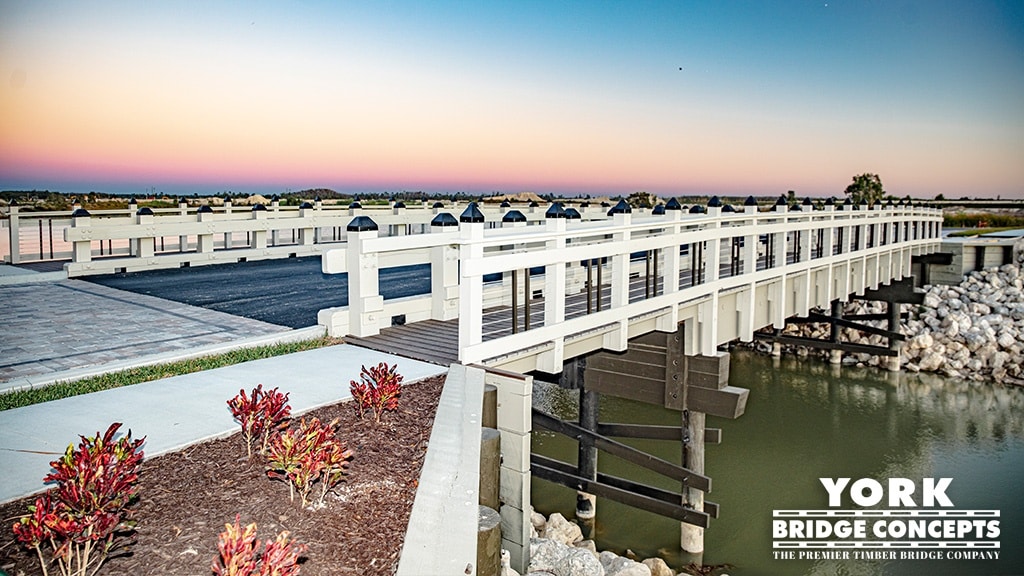
Aesthetics
Timber bridges offer a natural, rustic appearance that blends harmoniously with the surrounding environment. In contrast, culvert bridges often look industrial and out of place in natural settings.
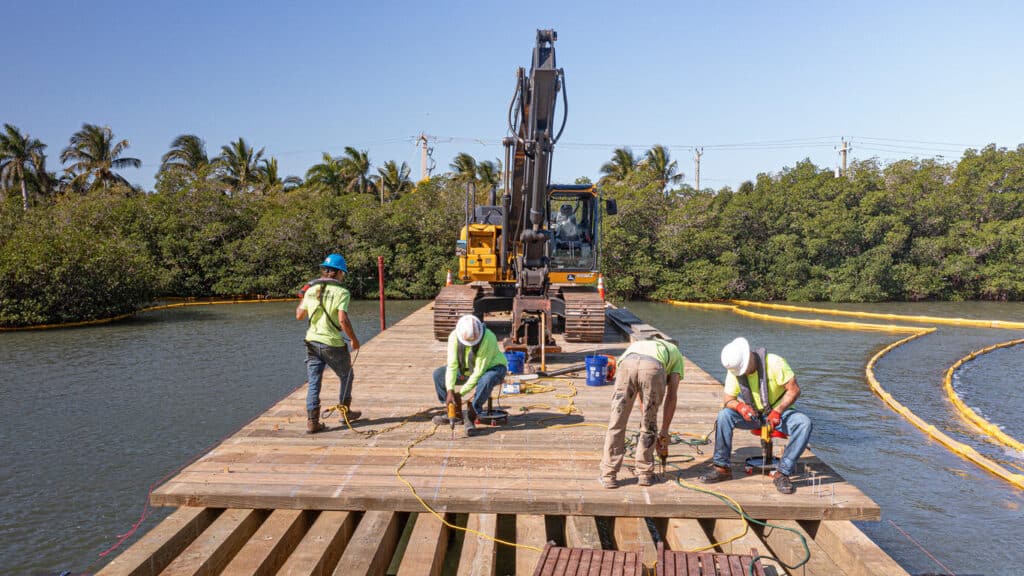
Environmental Impact
The production of concrete and metal involves significant carbon emissions. Timber, on the other hand, is a renewable resource that helps sequester carbon.
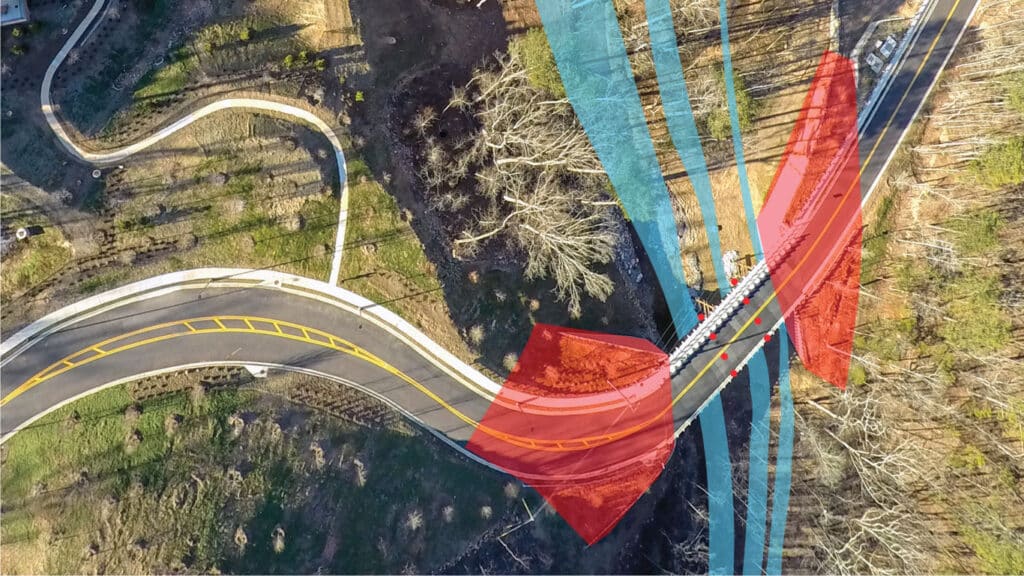
Ecosystem Preservation
Timber bridges can be designed to minimize disruption to local ecosystems. Culvert installations often alter water flow and can negatively impact aquatic habitats.
Timber Bridges vs. Concrete Bridges
Concrete bridges are a common choice for many infrastructure projects, but they come with several environmental drawbacks:
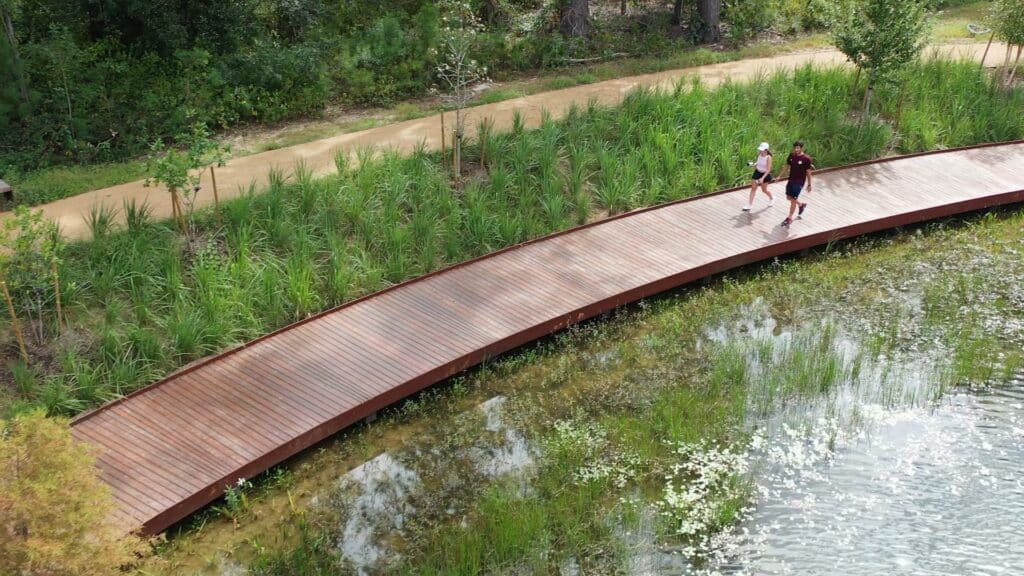
Carbon Footprint
Concrete production is a major source of carbon dioxide emissions. Timber bridges, using sustainably sourced wood, have a much lower carbon footprint.

Heat Island Effect
Concrete surfaces can contribute to the urban heat island effect, raising temperatures in the surrounding area. Timber bridges do not have this effect and can help maintain a cooler, more natural environment.
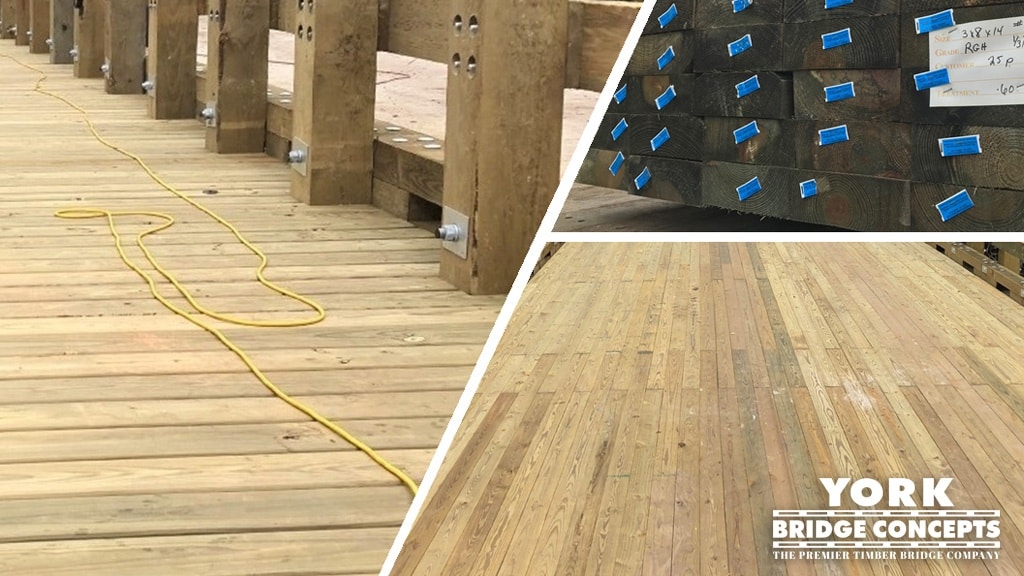
Resource Intensity
The extraction and processing of materials for concrete are highly resource-intensive. Timber, especially when sustainably harvested, is a more resource-efficient option.
Timber Bridges vs. Steel Bridges
Steel bridges are known for their strength and durability, but ecological considerations often make timber a more appealing choice:
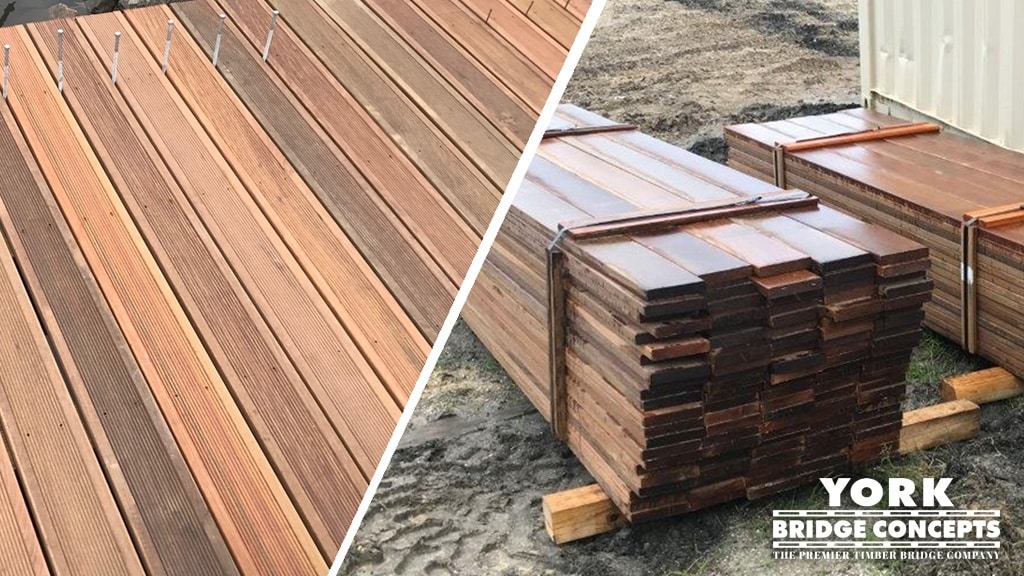
Energy Usage
Producing steel requires significant amounts of energy and emits a large quantity of greenhouse gases. Timber production is less energy-intensive and more environmentally friendly.

Recyclability
While steel is recyclable, the process still consumes a lot of energy. Timber, particularly when sourced from well-managed forests, is a renewable resource that supports sustainable forestry practices.
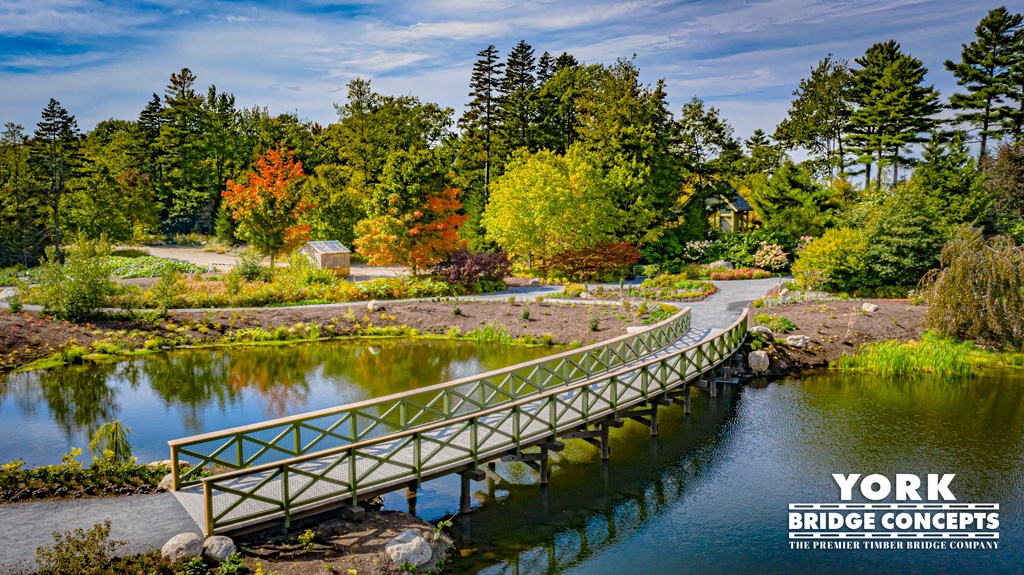
Environmental Integration
Timber bridges blend more naturally into landscapes, providing an aesthetically pleasing and environmentally sensitive solution. Steel bridges often clash with natural surroundings, detracting from the visual and ecological harmony.
Why York Bridge Concepts Is Your Premier Choice
Proven Track Record
Delivering exceptional timber-built vehicular bridges that have stood the test of time for decades.
Sustainability
We believe in building bridges to a sustainable future. Our eco-friendly practices set us apart in the industry.
Expertise
With decades of experience, we bring unparalleled expertise to every project. Masterfully creating your icon.
Customization
Your vision is our blueprint. We tailor our solutions to meet your specific needs and aesthetic preferences.
Feel Good About Your Decision With A YBC Timber Bridge
York Bridge Concepts is dedicated to building bridges that are not only functional and beautiful but also environmentally responsible. By utilizing sustainably sourced timber and incorporating recycled materials, we provide an eco-friendly alternative to traditional bridge materials. Our commitment to ecological materials ensures that our bridges are a sustainable choice for any project, offering both environmental and economic benefits. For potential customers considering culvert, concrete, or steel materials, our timber bridges present a compelling, sustainable alternative that supports a healthier planet.
1. Jim Bower, Portland Cement as a Construction Material: How Does It Compare to Wood, Steel?, Dovetail, Inc., page 4.
2. Use of structural wood in commercial buildings reduces greenhouse gas emissions, Oregon State University, 2017.
Not sure where to begin?
we can help.
